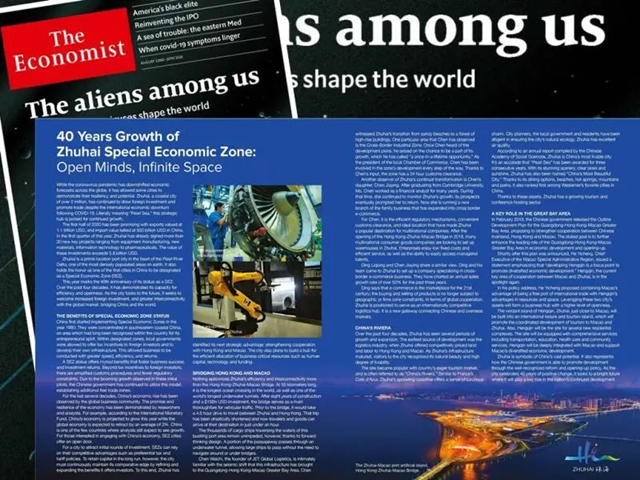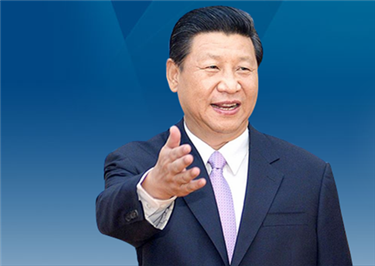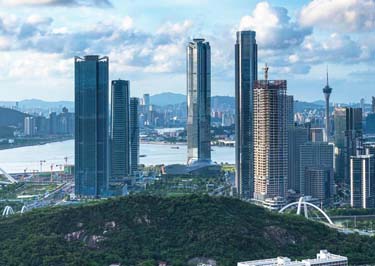40 years growth of Zhuhai SEZ: Open minds, infinite space

While the coronavirus pandemic has downshifted economic forecasts across the globe, it has allowed some cities to demonstrate their resiliency and potential. Zhuhai, a coastal city of over 2 million, has continued to draw foreign investment and promote trade despite the international economic downturn following COVID-19. Literally meaning "Pearl Sea," this strategic hub is poised for continued growth.
The first half of 2020 has been promising with exports valued at 1.1 trillion USD, and import value tallied at 930 billion USD in China. In the first quarter of this year, Zhuhai has already signed more than 30 new key projects ranging from equipment manufacturing, new materials, information technology to pharmaceuticals. The value of these investments exceeds 5.8 billion USD .
Zhuhai is a prime location port city in the heart of the Pearl River Delta, one of the most densely populated areas on earth. It also holds the honor as one of the first cities in China to be designated as a Special Economic Zone (SEZ).
This year marks the 40th anniversary of its status as a SEZ. Over the past four decades, it has demonstrated its capacity for efficiency and openness. As the city looks to the future, it seeks to welcome increased foreign investment, and greater interconnectivity with the global market, bridging China and the world.
The Benefits of Special Economic Zone Status
China first started implementing Special Economic Zones in the year 1980. They were concentrated in southeastern coastal China, an area which had long been recognized within the country for its entrepreneurial spirit. Within designated zones, local governments were allowed to offer tax incentives to foreign investors and to develop their own infrastructure. This allowed business to be conducted with greater speed, efficiency, and returns.
A SEZ status offers myriad benefits that foster business success and investment returns. Beyond tax incentives to foreign investors, there are simplified customs procedures and fewer regulatory constraints. Due to the booming growth observed in these initial pilots, the Chinese government has continued to utilize this model, establishing additional free trade zones.
For the last several decades, China's economic rise has been observed by the global business community. The promise and resilience of the economy has been demonstrated by researchers and analysts. For example, according to the International Monetary Fund, China's economy is projected to grow this year while the global economy is expected to retract by an average of 3%. China is one of the few countries where analysts still expect to see growth. For those interested in engaging with China's economy, SEZ cities offer an open door.
For a city to attract initial rounds of investment, SEZs can rely on their competitive advantages such as preferential tax and tariff policies. To retain capital in the long run, however, the city must continuously maintain its comparative edge by refining and expanding the benefits it offers investors. To this end, Zhuhai has identified its next strategic advantage: strengthening cooperation with Hong Kong and Macao. The city also plans to build a hub for the efficient allocation of business critical resources such as human capital, technology and funding.
Bridging Hong Kong and Macao
Nothing epitomizes Zhuhai's efficiency and interconnectivity more than the Hong Kong-Zhuhai-Macao Bridge. At 55 kilometers long, it is the longest ocean crossing in the world, as well as one of the world's longest underwater tunnels. After eight years of construction and a $15Bn USD investment, the bridge serves as a main thoroughfare for vehicular traffic. Prior to the bridge, it would take a 4.5 hour drive to travel between Zhuhai and Hong Kong. That trip has been drastically shortened and now travelers and goods can arrive at their destination in just under an hour.
The thousands of cargo ships traversing the waters of this bustling port area remain unimpeded, however, thanks to forward thinking design. A portion of the passageway passes through an underwater tunnel, allowing large ships to pass without the need to navigate around or under bridges.
Chen Weichi, the founder of JET Global Logistics, is intimately familiar with the seismic shift that this infrastructure has brought to the Guangdong-Hong Kong-Macao Greater Bay Area. Chen witnessed Zhuhai’s transition from sandy beaches to a forest of high-rise buildings. One particular area that Chen has observed is the Cross-Border Industrial Zone. Once Chen heard of the development plans, he seized on the chance to be a part of its growth, which he has called “a once-in-a-lifetime opportunity.” As the president of the local Chamber of Commerce, Chen has been involved in the zone’s development every step of the way. Thanks to Chen's input, the zone has a 24 hour customs clearance.
Another observer of Zhuhai's continual transformation is Chen's daughter, Chen Jiaying. After graduating from Cambridge University, Ms. Chen worked as a financial analyst for many years. During that time, she continued to monitor Zhuhai’s growth; its prospects eventually prompted her to return. Now she is running a new branch of the family business that has expanded into cross border e-commerce.
For Chen, it is the efficient regulatory mechanisms, convenient customs clearance, and ideal location that have made Zhuhai a popular destination for multinational companies. After the opening of the Hong Kong-Zhuhai-Macao Bridge in 2018, many multinational consumer goods companies are looking to set up warehouses in Zhuhai. Enterprises enjoy low fixed costs and efficient service, as well as the ability to easily access managerial talents.
Ding Liqiang and Chen Jiaying share a similar view. Ding and his team came to Zhuhai to set up a company specializing in cross-border e-commerce business. They have charted an annual sales growth rate of over 50% for the past three years.
Ding says that e-commerce is the marketplace for the 21st century; the buying and selling of products is no longer subject to geographic or time zone constraints. In terms of global cooperation, Zhuhai is positioned to serve as an internationally competitive logistics hub. It is a new gateway connecting Chinese and overseas markets.
China's Riviera
Over the past four decades, Zhuhai has seen several periods of growth and expansion. The earliest source of development was the logistics industry, when Zhuhai offered competitively priced land and labor to Hong Kong and Macao. As Zhuhai’s infrastructure matured, visitors to the city recognized its natural beauty and high degree of livability.
The site became popular with country's eager tourism market, and is often referred to as "China's Riviera." Similar to France's Cote d'Azur, Zhuhai’s sprawling coastline offers a sense of luxurious charm. City planners, the local government and residents have been diligent in ensuring the city's natural ecology. Zhuhai has excellent air quality.
According to an annual report compiled by the Chinese Academy of Social Sciences, Zhuhai is China's most livable city. It's an accolade that "Pearl Sea" has been awarded for three consecutive years. With its stunning scenery, clear skies and sunshine, Zhuhai has also been named "China's Most Beautiful City." Thanks to its dining options, beaches, hot springs, mountains and parks, it also ranked first among Westerner's favorite cities in China.
Thanks to these assets, Zhuhai has a growing tourism and conference hosting sector.
A Key Role in the Great Bay Area
In February 2019, the Chinese government released the Outline Development Plan for the Guangdong-Hong Kong-Macao Greater Bay Area, proposing to strengthen cooperation between Chinese mainland, Hong Kong and Macao. The stated goal is to further enhance the leading role of the Guangdong-Hong Kong-Macao Greater Bay Area in economic development and opening-up.
Shortly after this plan was announced, Ho Iat Seng, Chief Executive of the Macao Special Administrative Region, issued a statement emphasizing that "developing Hengqin is a focus point to promote diversified economic development." Hengqin, the current key area of cooperation between Macao and Zhuhai, is in the spotlight again.
In his policy address, Ho Iat Seng proposed combining Macao's advantage of being a free port of international trade with Hengqin's advantages in resources and space. Leveraging these two city's assets will form a business hub with a higher level of openness.
The verdant island of Hengqin, Zhuhai, just close to Macao, will be built into an international leisure and tourism island, which will promote the coordinated development of tourism to Macao and Zhuhai. Also, Hengqin will be the site for several new residential complexes. The site will be equipped with comprehensive services including transportation, education, health care and community services. Hengqin will be deeply integrated with Macao and support Macao's diversified economic development.
Zhuhai is symbolic of China's vast potential. It also represents how the Chinese government is able to promote development through the well-recognized reform and opening-up policy. As the city celebrates 40 years of positive change, it looks to a bright future where it will play a key role in the nation's continued development.







